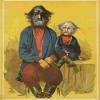though I have also heard someone say that German board games tend to be more complex and abstract than board games designed in other countries.
Yes, this is even true (as a tendency) if you consider German German-style boardgames vs. North American German-style board games. The German ones aren't necessarily more complex in the strategic sense, but there tends to be more manipulation of lots of little pieces of different kinds and functions. (Hal Barwood's giant collaborative list of game design maxims suggested that when designing for the German market, don't take away the player's ability to micromanage.) And the connection between mechanics and theme is often a little looser; you could more easily "re-skin" the game without changing the mechanics.
There's a parellel to videogames there, too, which I didn't think about until you brought up emotion and RPGs. North American German-style boardgames (variously called "Ameristyle", "Ameritrash", or "Thematic" games) have a greater tendency to go for immersion in a dramatic theme, role-playing elements, "hero" pieces with distinct powers, and the creation of high-tension situations. (Like consider Pandemic a prototypical example, with maybe Puerto Rico as the prototypical Eurostyle game.) This is the same thing we see in a lot of videogames, with a notable exception of German-style economic sims.









